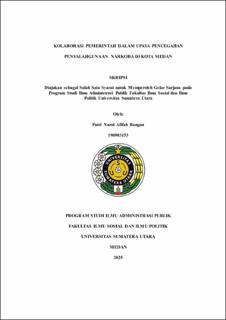| dc.description.abstract | This study examines the issue of drug abuse in Medan City, which has the
highest number of drug-prone and drug-vulnerable areas in North Sumatra
Province, with a total of 145 urban villages. In an effort to reduce the number of
such areas, the government has implemented various preventive measures through
a collaborative approach. These prevention efforts are carried out by the National
Narcotics Agency of North Sumatra Province, the Agency for National Unity and
Politics of North Sumatra Province, and the Family Welfare Empowerment
Mobilization Team of North Sumatra Province, through the implementation of the
Family Anti-Drug Resilience Program. This initiative also involves participation
from non-governmental organizations.
This research employs a qualitative method with a descriptive approach.
The research informants include representatives from the the National Narcotics of
North Sumatra Province, the Agency for National Unity and Politics of North
Sumatra Province, the Family Welfare Empowerment Mobilization Team of North
Sumatra Province, and the Association fro Caring for Others in Medan City. Data
were collected through both primary and secondary sources using techniques such
as interviews, observation, and documentation.
The results of the study reveal several collaborative actions taken in the
implementation of the Family Anti-Drug Resilience Program. One of the activities
conducted is drug abuse awareness campaigns carried out jointly by the National
Narcotics Agency, the Family Welfare Empowerment Mobilization Team, and the
Association for Caring for Others. However, the implementation of this program
faces several challenges, including low community participation, limited human
resources, and insufficient budget allocation. Therefore, there is a need for greater
support from the private sector, enhancement of human resource capacity, and the
strengthening of regional regulations such as the establishment of local regulations
on drug control to reinforce stakeholder collaboration in addressing drug abuse
prevention efforts in Medan City. | en_US |


